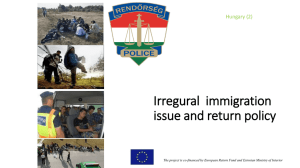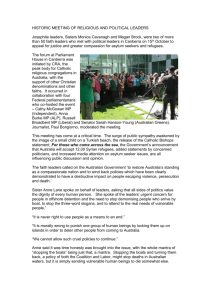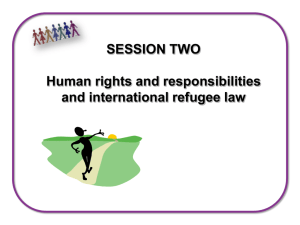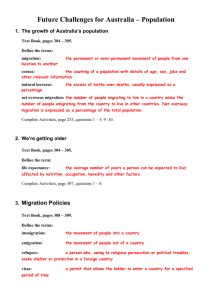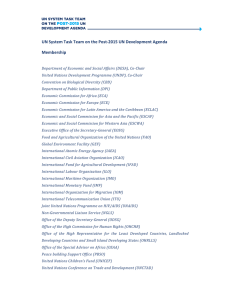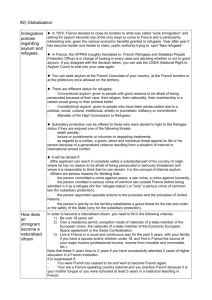Migration Amendment (Unauthorised Maritime Arrivals and Other Measures) Bill 2012
advertisement
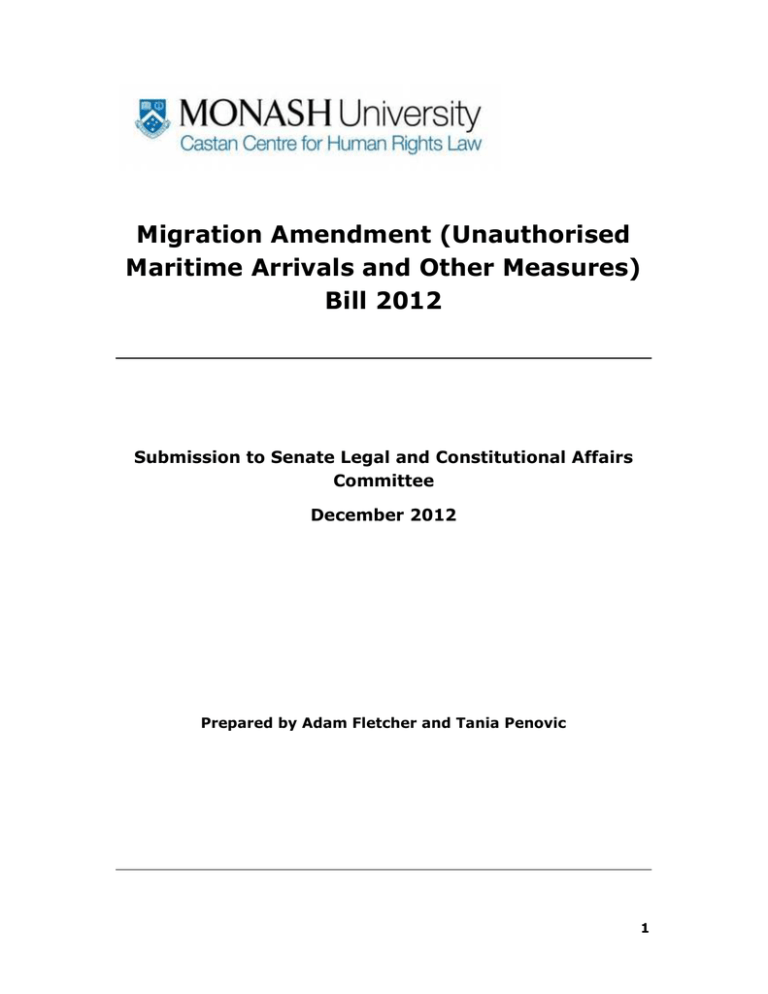
Migration Amendment (Unauthorised Maritime Arrivals and Other Measures) Bill 2012 Submission to Senate Legal and Constitutional Affairs Committee December 2012 Prepared by Adam Fletcher and Tania Penovic 1 Introduction In September 2001 the Howard Government passed the Migration Amendment (Excision from Migration Zone) Act, which amended the Migration Act 1958 (the Act).1 This Act designated certain parts of Australian territory where asylum seekers were most likely to land as ‘excised offshore places.’ That is, persons arriving on them by boat without previously obtaining a visa were not subject to the usual immigration procedures. Instead, they were subjected to the incipient offshore detention arrangements. Five years later, shortly after announcing measures designed to alleviate the harshness of mandatory detention for families and children, the Government introduced a Bill (the Migration Amendment (Designated Unauthorised Arrivals) Bill 2006). This Bill would have effectively excised the Australian mainland from the migration zone – a controversial step which was rejected even by some Liberal MPs.2 The 2006 Bill was also rejected by the Senate Legal and Constitutional Legislation Committee,3 to which the Castan Centre made a submission.4 That submission presented a detailed overview of the issues involved in subjecting people who arrive on the mainland to offshore processing, and many of the arguments it makes are applicable to the present Bill. We will only reprise a selection here; we refer to the 2006 submission where it contains more detail on relevant points. Characterisation of the Bill and Expert Panel Recommendation The Explanatory Memorandum for the present Bill reminds us that it would implement a recommendation of the Prime Minister’s Expert Panel on Asylum Seekers – specifically Recommendation 14 in its final report. The objective of this recommendation is said to be the avoidance of further loss of life at sea from asylum seekers attempting to reach the mainland (to take advantage of different reception processes). While we do not deny that avoiding further maritime disasters must be a high priority, the Centre observes that this amendment would also have the effect of extending the heavily criticised offshore (latterly known as regional) processing regime to a new class of people – asylum seekers who arrive on the Australian mainland. Any expansion of this legally dubious regime is undesirable. 1 See DIAC Fact Sheet 81: Excised Offshore Places <http://www.immi.gov.au/media/fact-sheets/81excised-offshore.htm>. 2 See eg Judi Moylan, 2nd Reading Speech, available at: <http://www.judimoylan.com.au/LatestNews/Speeches/tabid/71/articleType/ArticleView /articleId/726/MIGRATION-AMENDMENT-DESIGNATED-UNAUTHORISED-ARRIVALS-BILL2006-Second-reading.aspx>. 3 See Committee Report, Recommendation 1: <http://www.aph.gov.au/Parliamentary_Business/Committees/Senate_Committees?url= legcon_ctte/completed_inquiries/200407/migration_unauthorised_arrivals/report/report.pdf>. 4 See: <http://www.aph.gov.au/Parliamentary_Business/Committees/Senate_Committees?url= legcon_ctte/completed_inquiries/200407/migration_unauthorised_arrivals/submissions/sub80.pdf>. 2 Commentary on Provisions The Bill provides (in clause 5AA(1)) that a person entering Australia by sea, whether at an excised offshore place or anywhere else, is an unauthorised maritime arrival. It is unclear why the concept of excised offshore places is being retained – this Bill effectively excises the mainland from the migration zone, which appears to render the concept redundant. The Bill also extends the definition of transitory persons in the Act to include those who have been assessed as refugees under the 1951 Refugees Convention (see clause 47). This means that, for the first time, the Act would provide for the mandatory detention and transfer to a regional processing centre of genuine refugees (not only asylum seekers), based solely on the mode of their arrival. This may be primarily intended as a measure to deter people from taking dangerous sea voyages, but it effectively penalises refugees for arriving by sea, which is in direct defiance of Australia’s obligations under article 31 of the Refugees Convention. Under the Act as amended, genuine refugees would also be prevented from applying for a valid visa (without the Minister’s leave) and from accessing the courts under ss 198C and D of the Act. This would also contravene Australia’s obligations under the Convention (see in particular article 32) and under the International Covenant on Civil and Political Rights (ICCPR), which provides that no one may be deprived of liberty arbitrarily (in this case without a fair hearing).5 Statement of compatibility with Human Rights The Statement of Compatibility with Human Rights attached to the Explanatory Memorandum for the Bill contains a number of assertions which the Centre believes to be incorrect or incomplete. ICCPR The Statement claims that the right to freedom of movement in article 12 of the ICCPR is relevant, but that it is not ‘engaged’ because it only protects those who are lawfully in the territory of a State party. This ignores UN Human Rights Committee jurisprudence on article 12(1), which makes it clear that the law is not to be so baldly characterised: 5. The Covenant does not recognize the right of aliens to enter or reside in the territory of a State party. It is in principle a matter for the State to decide who it will admit to its territory. However, in certain circumstances an alien may enjoy the protection of the Covenant even in relation to entry or residence, for example, when considerations of non-discrimination, prohibition of inhuman treatment and respect for family life arise.6 5 6 ICCPR, article 9. See UN Human Rights Committee, General Comment 15, 4 November 1986. 3 The Committee goes on to say that “[a]liens have the full right to liberty and security of the person.”7 This includes the right not to be detained arbitrarily in undignified or inhuman conditions. Further, the Committee is of the view that “[a]liens shall be equal before the courts and tribunals, and shall be entitled to a fair and public hearing by a competent, independent and impartial tribunal established by law in the determination of any criminal charge or of rights and obligations in a suit at law.” Yet this Bill would allow transitory persons to be involuntarily transferred to a regional processing country with no right of appeal. The Centre’s 2006 submission contains analysis of the effect of withdrawing appeal rights.8 The Statement of Compatibility also dismisses the applicability of ICCPR article 13 too lightly. According to the UN Human Rights Committee: The particular rights of article 13 only protect those aliens who are lawfully in the territory of a State party. This means that national law concerning the requirements for entry and stay must be taken into account in determining the scope of that protection, and that illegal entrants and aliens who have stayed longer than the law or their permits allow, in particular, are not covered by its provisions. However, if the legality of an alien's entry or stay is in dispute, any decision on this point leading to his expulsion or deportation ought to be taken in accordance with article 13.9 Given the multiple ongoing legal disputes over the legality of entry to Australia for the purposes of seeking asylum, this passage is relevant to the current Bill. Furthermore, the Committee states that article 13 “[e]ntitles each alien to a decision in his own case and, hence, article 13 would not be satisfied with laws or decisions providing for collective or mass expulsions.”10 The transfer of transitory persons to a regional processing country without refugee status determination (or even in spite of confirmed refugee status) seems to fit the definition of a law providing for collective expulsion, which means our obligations under article 13 are clearly engaged, if not potentially breached. The Statement of Compatibility states that discretionary (as opposed to mandatory) detention will be introduced to allow flexibility to determine “whether persons that (sic) are not the subject of the Bill are liable to be detained (for example, persons who are not claiming asylum but have nonetheless entered Australian territory unlawfully), where detention may not be appropriate.” The implied claim that mandatory detention is more appropriate for those fleeing persecution than for others who land on our shores without a visa is incompatible with the objects and purposes of both the ICCPR and the Refugees Convention. Given the unreasonable basis of this mandatory detention 7 Ibid, para 7. See above, n 4, at 17-19. 9 Ibid, para 9 (emphasis added). 10 Ibid, para 10. 8 4 provision, and the arbitrary nature of mandatory detention under the Migration Act 1958,11 the Statement of Compatibility is incorrect to claim that article 9(1) is inapplicable to the amendments to s 189. Refugees Convention The Statement of Compatibility notes that the Refugees Convention “is not one of the treaties specified in the definition of ‘human rights’ in the Human Rights (Parliamentary Scrutiny) Act 2011,” but acknowledges that Australia has non-refoulement obligations under the ICCPR and the Convention Against Torture. The Statement argues that: [T]he Bill does not contain or amend any existing provisions which relate to removal that already exist with the Act (as amended by the Regional Processing Act). To that extent, the provisions in the Bill only contemplate increasing the scheme to those people who arrive directly at the Australian mainland. They do not affect the substantive current operation of the Act in relation to removal or regional processing arrangements nor impact on the protections against non-refoulement (sic) which already exist in legislation, policies and procedures. However, the practice of removal to countries which do not have protections against refoulement may contravene article 33 of the Refugees Convention as detailed in our 2006 submission.12 The conditions on Nauru and Manus Island, and the lack of protections against refoulement in their domestic legal regimes, may also mean that transfer to these places facilitates treaty violations, which in itself contravenes Australia’s obligations.13 The same argument applies to the Statement’s brief treatment of Australia’s obligations in relation to family life and protection for children under the ICCPR and the Convention on the Rights of the Child. For a thorough treatment of the potential breaches presented by the regional/offshore processing regime, please refer to our 2006 submission,14 and our more recent submission on the Migration Amendment (Healthcare for Asylum Seekers) Bill 2012. 15 As mentioned above, the distinction the Bill makes between those who arrive by air and by sea is also contrary to article 31 of the Refugees Convention – another point which the Statement of Compatibility overlooks, despite the fact that it raises the Convention. 11 See eg Shams et al v Australia, UN Doc CCPR/C/90/D/1255-1288, Views of 11 September 2007. 12 See above n 4, at 13. 13 See HRCee General Comment 31, UN Doc CCPR/C/21/Rev.1/Add.13, 26 May 2004, in particular paras 2, 10 and 12. 14 See above n 4, at 19-31. 15 See <http://law.monash.edu.au/castancentre/policywork/migration-amendmenthealthcare-bill-sub.pdf> 5 Other Rights The Statement of Compatibility does not even acknowledge other potential breaches of international law, including guarantees of non-discrimination under the ICCPR and the Refugees Convention. As we noted in our 2006 submission, the policies of excision and offshore processing created the ‘incongruous’ situation (criticised by the Expert Panel) which sees onshore arrivals treated differently from offshore entry persons. Rather than reviewing these policies for discriminatory effect, this Bill seeks to expand their scope. The Bill distinguishes, for example, between PNG citizens conducting ‘traditional activities’ and others who arrive in Australia by sea. The basis for this distinction, according to the Statement of Compatibility, is that the PNG citizens “do not seek to enter and remain in Australia for other than a short period of time” – that is, they are less likely to make asylum claims. This distinction clearly engages Australia’s obligations under article 2 of the ICCPR. Statement of Compatibility – Overview Due to the fact that the present Bill expands the scope of removal and regional processing arrangements, their compatibility with Australia’s human rights obligations is in fact highly relevant. The conclusion in the Statement of Compatibility that “[t]he Bill is compatible with human rights because it does not engage any obligations under relevant human rights treaties” is only tenable on an extremely narrow interpretation of the relevant treaties. Such an approach severely limits the potential of Statements of Compatibility to ‘further protect and promote human rights in Australia,’ which is their principal purpose.16 Conclusion and Recommendation The Centre strongly recommends this Bill not be passed. If it is passed, the Centre recommends its Statement of Compatibility be heavily revised to acknowledge the potential human rights implications of expansion of the regional transfer and processing arrangements, rather than summarily dismissing them as it presently does. 16 See Human Rights (Parliamentary Scrutiny) Bill 2010 [2], Explanatory Memorandum: <http://www.comlaw.gov.au/Details/C2010B00216/Explanatory%20Memorandum/Text>. 6
